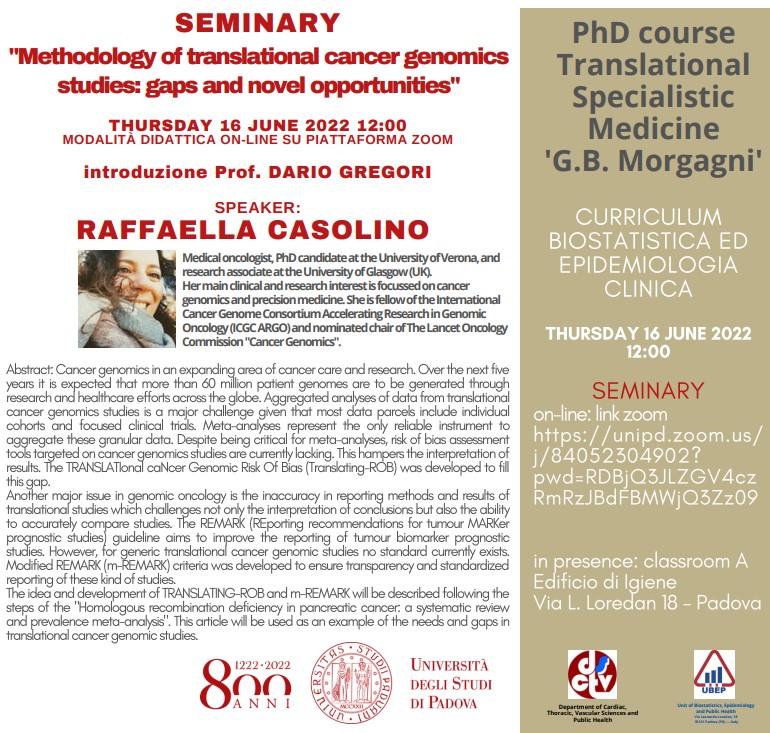SEMINARY “Methodology of translational cancer genomics studies: gaps and novel opportunities”
THURSDAY 16 JUNE 2022 12:00
ON-LINE ON ZOOM: https://unipd.zoom.us/j/84052304902?pwd=RDBjQ3JLZGV4czRmRzJBdFBMWjQ3Zz09
IN PRESENCE: Aula A Edificio di Igiene via L. Loredan 18 – Padova
Introduction by Prof. DARIO GREGORI
SPEAKER: RAFFAELLA CASOLINO, Medical oncologist, PhD candidate at the University of Verona, and Research associate at the University of Glasgow (UK). Her main clinical and research interest is focused on cancer genomics and precision medicine. She is fellow of the International Cancer Genome Consortium Accelerating Research in Genomic Oncology (ICGCARGO) and nominated chair of The Lancet Oncology Commission “Cancer Genomics”.
Abstract: Cancer genomics in an expanding area of cancer care and research. Over the next five years it is expected that more than 60 million patient genomes are to be generated through research and health care efforts across the globe. Aggregated analyses of data from translational cancer genomics studies is a major challenge given that most data parcels include individual cohorts and focused clinical trials. Meta-analyses represent the only reliable instrument to aggregate these granular data. Despite being critical for meta-analyses, risk of bias assessment tools targeted on cancer genomics studies are currently lacking. This hampers the interpretation of results. The TRANSLATIonal caNcer Genomic Risk Of Bias (Translating-ROB) was developed to fill this gap. Another major issue in genomic oncology is the inaccuracy in reporting methods and results of translational studies which challenges not only the interpretation of conclusions but also the ability to accurately compare studies. The REMARK (REporting recommendations for tumour MARKer prognostic studies) guideline aims to improve the reporting of tumour biomarker prognostic studies. However, for generic translational cancer genomic studies no standard currently exists. Modified REMARK (m-REMARK) criteria was developed to ensure transparency and standardized reporting of these kind of studies. The idea and development of TRANSLATING-ROBandm-REMARK will be described following the steps of the “Homologous recombination deficiency in pancreatic cancer: a systematic review and prevalence meta-analysis”. This article will be used as an example of the needs and gaps in translational cancer genomic studies.

